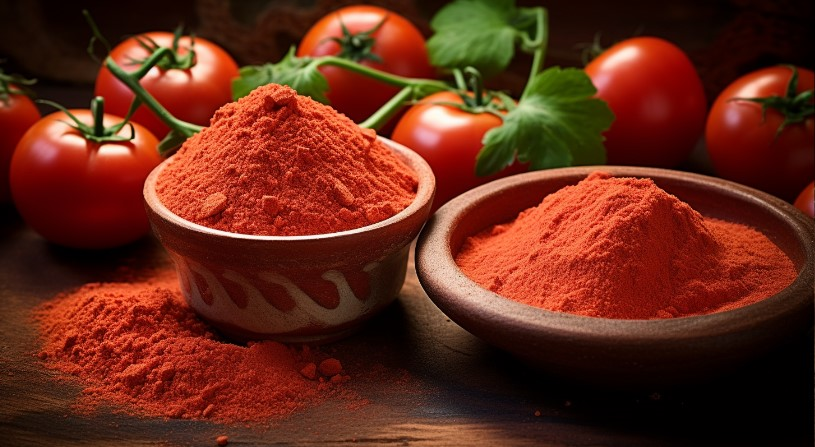Ликопин и здоровье

Lycopene is a terpenoid compound that is widely found in fruits and vegetables such as tomatoes, tomato products, and watermelons. It is a carotenoid that does not contain oxygen and cannot be converted into vitamin A in the human body, so it is not a provitamin A.
The effects discovered in current research include: reducing atherosclerosis and preventing and treating cardiovascular diseases; reducing the risk of fractures by inhibiting bone resorption; improving human metabolism and preventing and treating hyperlipidemia; anti-inflammation; enhancing human immunity; reducing the incidence of cancer; and reducing skin inflammation. Roughness, delaying skin aging, etc.
Lycopene antioxidant
Lycopene is the most effective singlet oxygen free radical scavenger among natural carotenes. Its ability to quench singlet oxygen is 2 times stronger than β-carotene and 100 times that of α-tocopherol, and its metabolites are extremely toxic. Low.
Lycopene can eliminate excess activity in the body by regulating the activity of three antioxidant enzymes: superoxide dismutase (SOD), glutathione peroxidase (GSH-Px), and catalase (CAT). Oxygen can also effectively scavenge hydroxyl radicals through addition reactions.
Studies have confirmed that increasing the intake of lycopene can effectively inhibit the oxidation of lipids, DNA and proteins, increase the activity of liver and plasma antioxidant enzymes, and significantly reduce the content of malondialdehyde (MDA) in serum.
Lycopene reduce the risk of cardiovascular disease
Some large-scale observational studies in European and American countries have found that lycopene levels in the body are inversely related to the risk of cardiovascular disease; in the European Multicenter Antioxidants and Myocardial Ischemia and Breast Cancer Study and the Women’s Health Study, it was found that fat and plasma Lycopene levels are inversely related to the occurrence of coronary heart disease.
Lycopene can significantly reduce serum TC and LDL contents, improve lipid metabolism, and reduce the direct damaging effect of LDL-C on the intima. It can also delay the progression of atherosclerosis by reducing TG and reducing TG deposition in arterial tissue. .
Lycopene and cancer
Lycopene has an obvious tumor-inhibiting effect and can effectively prevent the occurrence of various cancers, including prostate cancer, breast cancer, gastric cancer, lung cancer, oral cancer, pharyngeal cancer, esophageal cancer, colon cancer, and rectal cancer.
The most certain one is prostate cancer. Its mechanism of action may be related to its antioxidant effect and its ability to induce gap junction communication. In addition, lycopene can reduce the expression of prostate-specific antigen and IGF-1, thereby inhibiting prostate cancer. occurrence and development.
Lycopene other functions
Lycopene also has a neuroprotective effect, which is related to Parkinson’s disease, Alzheimer’s disease, etc., and can improve their cognitive function; it can also improve the body’s immunity, protect the skin, resist radiation, prevent osteoporosis, delay aging, etc. effect.
Dosage instructions
The main side effect of overdose currently found in the population is skin orange staining, which gradually disappears after cessation of ingestion. Therefore, the United States Food and Nutrition Board considers lycopenemia to be a reversible and harmless effect. At present, the specific recommended value given by our country is 18mg/d, and the maximum tolerated intake is 70mg/d.
Lycopene main food sources
Lycopene is mainly found in foods such as tomatoes, watermelon, grapefruit and guava, and in small amounts in fruits and vegetables such as carrots, pumpkins, plums, persimmons, peaches, mangoes, pomegranates and grapes.
The amount of lycopene in tomatoes varies with variety and ripeness. The higher the ripeness, the higher the lycopene content, and vice versa. Ripe tomatoes contain 4.4mg/100g of lycopene, and raw tomatoes contain 2.57mg/100g.
Ссылки:
[1] Chinese Nutrition Society. Reference intake of dietary nutrients for Chinese residents. Beijing: Science Press, 2014. [2]Agarwal, S., and AV Rao. “Tomato lycopene and its role in human health and chronic diseases.” CMAJ: Canadian Medical Association journal = journal de l’Association medicale canadienne 163.6(2000):739.[3] Miguez, AM, MP Mcnerney, and MP Styczynski. “Metabolomics Analysis of the Toxic Effects of the Production of Lycopene and Its Precursors.” Front Microbiol 9(2018):760-.[4]Shivani, et al. “Protective Effect of Total Carotenoid and Lycopene Intake on the Risk of Hip Fracture: A 17-Year Follow-Up From the Framingham Osteoporosis Study.” Journal of Bone & Mineral Research (2009).[5] Petyaev, Ivan M., et al. “Reduction of Liver Span and Parameters of Inflammation in Nonalcoholic Fatty Liver Disease Patients Treated with Lycosome Formulation of Phosphatidylcholine: A Preliminary Report.” International Journal of Chronic Diseases, 2018, (2018-4-1) 2018(2018):1-7.
